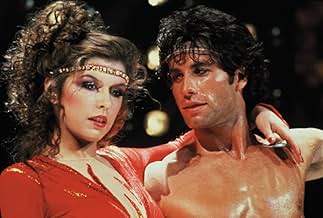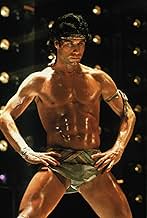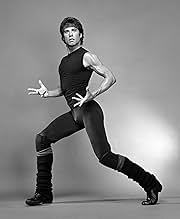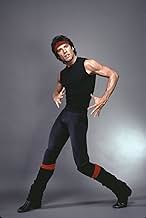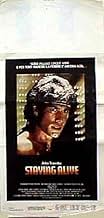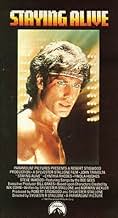Staying Alive
- 1983
- Tous publics
- 1h 33min
NOTE IMDb
4,8/10
18 k
MA NOTE
Cinq ans plus tard, la fièvre du samedi soir de Tony Manero fait toujours rage. Maintenant, il avance en se pavanant vers son plus grand défi à ce jour: réussir en tant que danseur sur la sc... Tout lireCinq ans plus tard, la fièvre du samedi soir de Tony Manero fait toujours rage. Maintenant, il avance en se pavanant vers son plus grand défi à ce jour: réussir en tant que danseur sur la scène de Broadway.Cinq ans plus tard, la fièvre du samedi soir de Tony Manero fait toujours rage. Maintenant, il avance en se pavanant vers son plus grand défi à ce jour: réussir en tant que danseur sur la scène de Broadway.
- Récompenses
- 6 nominations au total
Sarah M. Miles
- Joy
- (as Sarah Miles)
Histoire
Le saviez-vous
- AnecdotesJohn Travolta has claimed his favorite director to work with was Sylvester Stallone. He said Stallone knew how to make him look the best on screen.
- GaffesDuring the rehearsal segment, the camera crew is reflected in the mirrors.
- Citations
[last lines]
Tony Manero: Do you know what I wanna do? You know what I wanna do?
Jackie: What?
Tony Manero: Strut.
- Versions alternativesNBC edited just 30 seconds from this film for its 1987 network television premiere.
- ConnexionsFeatured in Bee Gees: Someone Belonging to Someone (1983)
- Bandes originalesThe Woman In You
Performed by The Bee Gees
Written by Barry Gibb, Robin Gibb and Maurice Gibb
Produced by Barry Gibb, Robin Gibb and Maurice Gibb, Karl Richardson and Albhy Galuten
Commentaire à la une
If Saturday Night was the fever, then Staying Alive is Sunday morning when the cold's broken and all you're left with are some sticky bedsheets.
Don't get me wrong, I do like Sylvester Stallone, but his finger has never been firmly on the button marked "quality control" and in directing this sequel he's produced one of his more notable failures. If Sly sees himself as God, then he moulds Travolta in his own image, a virtual look-alike with waxed chest, pumped-up physique and Rambo-style headband. This narcissistic study of excess seems determined to float around indulgent dance numbers and close-ups of John's crotch in too-tight tights.
The idea of updating the Tony Manero character for the aerobics generation isn't bad, but completely misguided here. The first Manero film was relatively gritty and harsh. Here the plot hinges entirely around the flaccid dance sequences, the character-based scenes serving only as filler between 80s pop. At one point Manero reveals that he has a "new mature outlook on life... I don't smoke, I don't drink, I don't curse." You know, all of the things that made him interesting in the first place?
The formerly hard-hearted Manero here meets his match with the dire Finola Hughes, playing an ice queen as shallow and insensitive as he is. Cue predictable role reversal theme as she dumps him after a one-night stand. I actually thought Hughes was sporting a fake English accent, but it turns out she really is a native it's just that her acting is so chronic. She's one of the main reasons the film doesn't work, as her misguided performance never really gels.
A montage is used to illustrate the developing relationship between Travolta and Hughes, which highlights co-writer Stallone's lack of skill with dialogue sequences. Much of the movie relies on music to artificially create its mood, including such subtleties as Frank Stallone's "Moody Girl". All the new songs, including the material by the Bee Gees, are strictly elevator muzak offerings; a shortcoming further highlighted by the use of the original's "Staying Alive" as the end credits theme.
Real problem with the picture is that many of the scenes are short and sketchy, creating a disjointed feel that prevents the viewer from becoming fully immersed in the narrative. The anaemic plot and lack of onscreen chemistry lends the film no dramatic impetus, and it just slides aimlessly from scene to scene. Now living in Manhattan, as at the end of the previous movie, Manero has no great motivation for bettering his life the same way he did in the first. There's no Bronx or oppression to escape, nowhere to run to. Manero's dream in this one is merely to star in a Broadway production of "Satan's Alley". Satan's Back Passage would be more appropriate. If this is Staying Alive then it's on a respirator machine somebody pull the plug.
Some of the lines aren't all that bad. After hearing second-best girlfriend Jackie (Cynthia Rhodes) saying goodnight to a male friend, Manero bemoans "It was so sweet, it was like syrup... I had a cavity just listening to it." The majority though falls between functional and cod psychology. "If you had a brain in that thick skull of yours, you'd stop worrying about trying to change other people, and start worrying about changing yourself!" Manero is told at one stage. Ultimately, the film scuppered my childish habit of using title quotes, as there really was nothing worth repeating.
Sequels are usually by definition lacking. Audiences want to see more of the characters they loved in the first place, yet they can rarely advance in case they become unrecognisable. Very few follow-ups expand or add to their source material, and, while different, Staying Alive brings nothing new to the party. Not truly terrible, but very forgettable, and completely inessential. 4/10.
Don't get me wrong, I do like Sylvester Stallone, but his finger has never been firmly on the button marked "quality control" and in directing this sequel he's produced one of his more notable failures. If Sly sees himself as God, then he moulds Travolta in his own image, a virtual look-alike with waxed chest, pumped-up physique and Rambo-style headband. This narcissistic study of excess seems determined to float around indulgent dance numbers and close-ups of John's crotch in too-tight tights.
The idea of updating the Tony Manero character for the aerobics generation isn't bad, but completely misguided here. The first Manero film was relatively gritty and harsh. Here the plot hinges entirely around the flaccid dance sequences, the character-based scenes serving only as filler between 80s pop. At one point Manero reveals that he has a "new mature outlook on life... I don't smoke, I don't drink, I don't curse." You know, all of the things that made him interesting in the first place?
The formerly hard-hearted Manero here meets his match with the dire Finola Hughes, playing an ice queen as shallow and insensitive as he is. Cue predictable role reversal theme as she dumps him after a one-night stand. I actually thought Hughes was sporting a fake English accent, but it turns out she really is a native it's just that her acting is so chronic. She's one of the main reasons the film doesn't work, as her misguided performance never really gels.
A montage is used to illustrate the developing relationship between Travolta and Hughes, which highlights co-writer Stallone's lack of skill with dialogue sequences. Much of the movie relies on music to artificially create its mood, including such subtleties as Frank Stallone's "Moody Girl". All the new songs, including the material by the Bee Gees, are strictly elevator muzak offerings; a shortcoming further highlighted by the use of the original's "Staying Alive" as the end credits theme.
Real problem with the picture is that many of the scenes are short and sketchy, creating a disjointed feel that prevents the viewer from becoming fully immersed in the narrative. The anaemic plot and lack of onscreen chemistry lends the film no dramatic impetus, and it just slides aimlessly from scene to scene. Now living in Manhattan, as at the end of the previous movie, Manero has no great motivation for bettering his life the same way he did in the first. There's no Bronx or oppression to escape, nowhere to run to. Manero's dream in this one is merely to star in a Broadway production of "Satan's Alley". Satan's Back Passage would be more appropriate. If this is Staying Alive then it's on a respirator machine somebody pull the plug.
Some of the lines aren't all that bad. After hearing second-best girlfriend Jackie (Cynthia Rhodes) saying goodnight to a male friend, Manero bemoans "It was so sweet, it was like syrup... I had a cavity just listening to it." The majority though falls between functional and cod psychology. "If you had a brain in that thick skull of yours, you'd stop worrying about trying to change other people, and start worrying about changing yourself!" Manero is told at one stage. Ultimately, the film scuppered my childish habit of using title quotes, as there really was nothing worth repeating.
Sequels are usually by definition lacking. Audiences want to see more of the characters they loved in the first place, yet they can rarely advance in case they become unrecognisable. Very few follow-ups expand or add to their source material, and, while different, Staying Alive brings nothing new to the party. Not truly terrible, but very forgettable, and completely inessential. 4/10.
- The_Movie_Cat
- 7 avr. 2001
- Permalien
Meilleurs choix
Connectez-vous pour évaluer et suivre la liste de favoris afin de recevoir des recommandations personnalisées
- How long is Staying Alive?Alimenté par Alexa
Détails
- Date de sortie
- Pays d’origine
- Langue
- Aussi connu sous le nom de
- Saturday Night Fever 2
- Lieux de tournage
- Sociétés de production
- Voir plus de crédits d'entreprise sur IMDbPro
Box-office
- Budget
- 22 000 000 $US (estimé)
- Montant brut aux États-Unis et au Canada
- 64 892 670 $US
- Week-end de sortie aux États-Unis et au Canada
- 12 146 143 $US
- 17 juil. 1983
- Montant brut mondial
- 64 893 329 $US
- Durée1 heure 33 minutes
- Couleur
- Rapport de forme
- 1.85 : 1
Contribuer à cette page
Suggérer une modification ou ajouter du contenu manquant

Lacune principale
What was the official certification given to Staying Alive (1983) in Mexico?
Répondre
